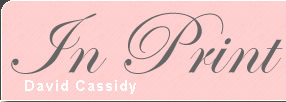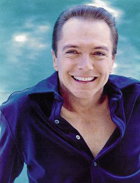
The Talk of Town
The New Yorker June 24, 1972
By Anthony Hiss
Which brings us to David Cassidy. For some time now, millions of nice little girls all over the country have had mad crushes on David Cassidy. "Little" in this context means a hell curve that starts about eight, peaks about eleven, and ends about fourteen; "nice" means tractable and above the pauper line. They collect photographs of him, dream about him, write him letters, send him presents, and scream at the sight of him. Cassidy is a promising young actor with a pleasant singing voice and a smile that is sort of somewhere between cute and dazzling. He never means to become an idol of little girls, but these things happen. A couple of years ago, he landed a part in a new TV sitcom called "The Partridge Family," which was about a fatherless American family that was a rock group but was also really just a family. Cassidy played the teen-age son of the family and the lead singer of the rock group. The show was a hit, so the Partridge Family started cutting albums of the songs they sang on the show, and the albums were a hit, so Cassidy began making solo appearances as a singer. Earlier this year, he came to New York and played to a packed house at the Garden. The day after the first Presley concert, he was back here for a matinée at the new Nassau County Coliseum. Those who know about such things say that Cassidy is on the verge of being jilted by the little girls, but in the latest issue of 16 Magazine, which is a trade magazine for little girls, he is still the leading attraction. Full-color picture on inside cover. Lead article on page 3. Last paragraph from that article:
Now David is beginning to grow sleepy. There´s a soft glow around him and he feels all warm and cuddly. Somehow - through a trick of his imagination perhaps - he feels the girl he longs for right there in the room near him, and moving closer. As David drifts off into dreamland, he reaches out. He can feel her hand in his. He gently pulls her close to him, puts both his arms around her, snuggles up, smiles happily - and falls asleep holding his pillow in his arms.
The whole phenomenon is rather good-natured. The little girls don´t take it entirely seriously. Neither does Cassidy. There were a lot of little girls hanging around the motel that Cassidy checked into before his appearance at the Nassau County Coliseum. We talked to a number of them. One group banged on his door and woke him up. They then called him on the phone to apologize and woke him up again. Another group denounced the behavior of the first group as "teenile." A third group waylaid us and made us write down their names in our notebook, so that we wouldn´t forget to convey their love to Cassidy. Our notebook says:
mary and heather and Vanessa and janet and sherry and nancy and debby and cythia love david.
The concert was sold out. As soon as Cassidy appeared onstage, the little girls in the audience began to sream and to take pictures. All the cameras were equipped with flash cubes, and all the flash cubes went off one after another, squirting tiny bursts of light in Cassidy´s direction. Flash cubes are a new form of visual applause. We admired the girl´s ability to do two things at once. During one of Cassidy´s songs, some of the girls rushed the stage. Most of them were headed off by several college-football players hired to augment the Coliseum´s security staff, but one of them managed to grab Cassidy around his neck and grapple with him for fully thirty seconds.
We interviewed Cassidy after the concert. He was sitting on a bed in another motel, wrapped in a towel. His clothes hadn´t caught up with him yet. He is a small man - short, and narrow in the shoulders. He sits with his shoulders hunched. He hab a bruise on his back, and he said that the girl who had rushed the stage had frightened him. He said that he liked most rock music but that the years 1963, 1964, and 1965 had been the most important ones in forming his musical tastes. He said that he admired the Rolling Stones but found their recent albums disappointing. He said that Paul McCartney was his favorite songwriter and that in his opinion McCartney outranked Cole Porter and Rogers and Hammerstein. He said that after he´d played the Garden he and his staff had sat around trying to figure out how much G.E. and Sylvania had made on flash cubes during his concert. The figure they came up with was nine thousand dollars.
